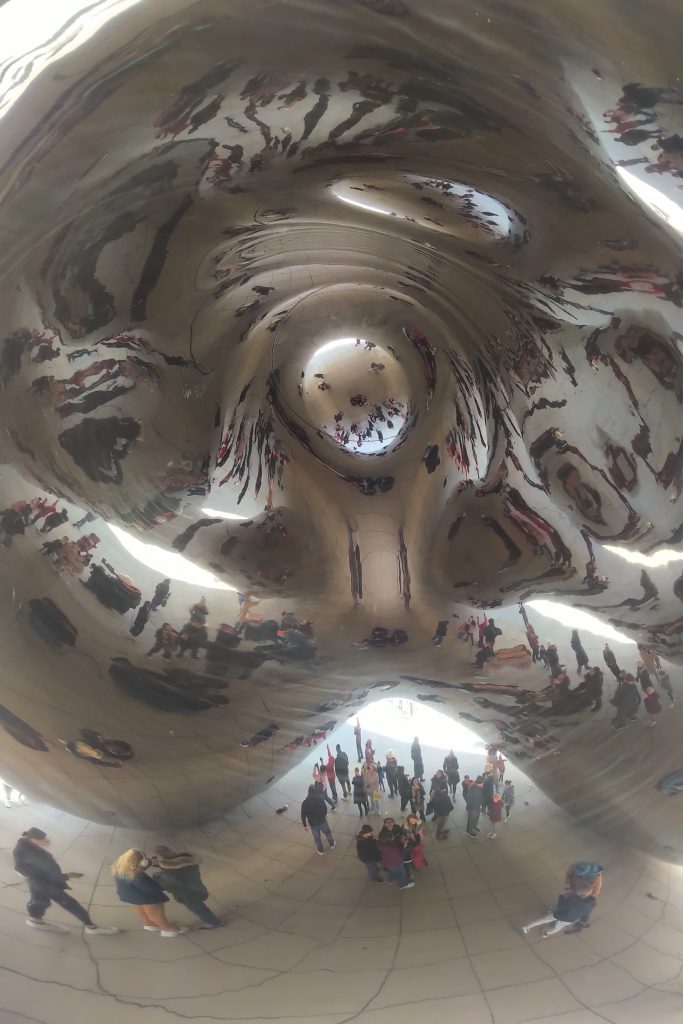A reflection on reflection; Or, a reflection on a reflection I did not end up writing

by Luisa Wan
As I was scrambling to put together my paper for the 2023 Annual Meeting of the American Comparative Literature Association, I made a casual promise to my friend and the amazing editor of this magazine, Shameera Nair Lin, that I would come back with a reflection for them. How hard could it be? I thought. I’ve written loads of reflections before, and like those throwaway pieces, this will be no different. If anything, my rookie experience at an international conference could at least make for some funny stories.
But when I returned from windy Chicago at the end of March, I gradually came to the realisation that I have seriously underestimated my task. Amidst mounting references to Nathan Heller’s “The End of the English Major”[1] and back-to-back panels where people flew in from all corners of the world to meet in glitzy Sheraton in Chicago, I found myself at a loss for words to describe what I have experienced. While I could blame the 12-hour time difference for my sense of disorientation, I suspect the reasons for my inability to reflect are slightly more complicated. So in lieu of a reflection on ACLA, allow me to take a few steps back and reflect on the reflection.
*
If you’ve gone through the Hong Kong education system, chances are you’re familiar with writing a reflection. You know the type I’m talking about: the ones you submit after a mandatory—always classical music—performance, a visit to the art or history museum, or after finishing a stack of compulsory summer reading. For educators, reflections seem to be the fool proof way to encourage participation, observation, and analysis. After all, how do you get students interested in classical music, and on top of that, make sure they pay actual attention to the concert and are not just sitting there wishing they’re at a Mirror performance instead? Daydreaming is probably not the kind of aesthetic education you had in mind.
Of course, the reflection is essentially a teleological form implying that there’s always a lesson to be learnt at the end of an experience, and as good literary students, we’re trained to be critical of that. Yet, by necessity, teleology takes pride of place in the frame of pedagogy. For one, the most valuable lesson I learnt from my Certificate in Teaching and Learning in Higher Education (CETL) training was how to set learning outcomes. Because when all is said and done, can you really be a good teacher if you can’t quantify your students’ progress? While I certainly enjoyed much of my literary education in high school, I could not help but feel a bit confused by its mode of evaluation. If anything, the examination preparation consisted more of memorising quotations from books than training our ability to form coherent arguments. (Anecdotally, I have a sentence-long definition of literature tidily jotted down in my high school notebook. Make of it what you will: “Literature is a perception of human experience crafted in language,” it says.)
I could go on about my education, but in terms of the reflection, what I’ve come to realise is that it can only do so much if the person writing it does not have the language to communicate what they have experienced. In between CV-bulking extra-curriculars and daily past paper drills, the experiential reflection is simply demoted to second, third, or really, last place. And this is not to say students are not smart or experienced enough. On the very contrary, without so much training as grasping, we as students all arrived at a formula for writing an adequate—and by this I mean target-oriented—reflection. Even as kindergarteners, we understood that there has to be a message behind every story, and there’s simply no way you can write a book review if you don’t “get the message.” And indeed, on many other occasions, the message was clear enough. After years of practice, one simply knows not to write anything other than “meaningful” on a reflection form after a compulsory volunteer activity for the “Other Experiences” section of the School-Based Assessment.
*
This is not to say that this sort of reflection is what Shameera had in mind when they tasked me with writing one for ACLA. And as someone researching on the literary form of the personal essay, I am aware there are many different treatments of the reflection. But as I tried to bring myself to reflect on my experiences, all that came to mind was a totally unrelated memory: At a classical music concert I attended years ago, amidst not-so-subtle snobbish frowns, a couple of uniform-cladded teenagers felt compelled to pull out a worksheet and started scribbling. As I think back to this moment now, I realise what I have witnessed was a triumphant moment of our education. And in this era of mandatory school trips to the mainland and regular flag-raising ceremonies, perhaps there really is no better time for the reflection.
[1] Heller, Nathan. “The End of the English Major.” The New Yorker, 27 Feb. 2023, https://www.newyorker.com/magazine/2023/03/06/the-end-of-the-english-major. Accessed 25 Apr. 2023.